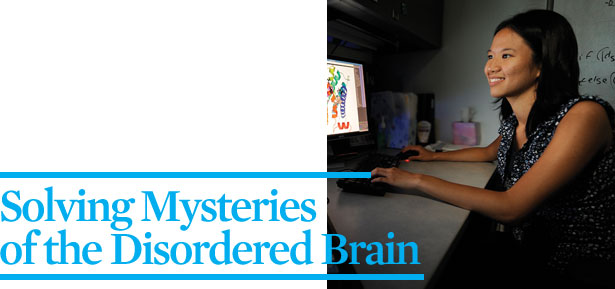
Is this it? A colorful computer model illustrates one possible version of the protein Elizabeth Dong is seeking.
Photo by John Russell/Courtesy of Vanderbilt University
Elizabeth Dong '07 is working on a protein. In a computer-generated 3-D model, it might look like seven pieces of curly Christmas ribbon looped together with string. But beyond that, she doesn't know what it looks like — no one does.
This microscopic protein has big implications. It can regulate how much of the chemical glutamate, which transmits information from one neuron to another, gets into the brain. Change the amount of glutamate that reaches the neurons, and you change — and potentially improve — brain function.
For people with difficult-to-understand conditions such as schizophrenia and fragile X syndrome, a genetic condition linked to autism, an improvement in brain function is a big deal. If Dong's research team can find the structure of the protein, they could develop a drug to bind the protein, change its function, and provide new treatments for these cognitive disorders.
"I like the idea of doing cutting-edge research where there are a lot of unknowns, so there's a lot left to discover," she says. "There's a lot of problem-solving and creativity."
"I like the idea of doing cutting-edge research where there are a lot of unknowns, so there's a lot left to discover," says Elizabeth Dong of her research on proteins in the brain.
Dong is an M.D./Ph.D. student in the medical scientist training program at Vanderbilt University in Nashville, Tennessee, and was named the Vanderbilt Prize Student Scholar in 2010. Dong will spend much of the next three years of her graduate work in front of a computer screen, developing and using software to generate possible models of the protein. Her enthusiasm for mysterious proteins was first kindled at Seattle Pacific University when, as a double major in math and biology, she worked on her University Scholars honors project with Associate Professor of Biochemistry Benjamin McFarland.
"He was a really great biochemistry professor," she says. "He would always relate his lectures on proteins to diseases, which really got me interested in this particular field. The type of research I did with him is very similar to the research I'm doing now."
She's quick to add that her medical research is never just about proteins. As part of her training, she's already spent two years in medical school, caring for some of the people who could one day benefit from this research.
"I talked to a lot of patients with schizophrenia," she says. "It's frustrating sometimes because there's so little that is being done for them. They have very limited options, because in this area of research, we don't understand the processes leading to disease. Patients keep trying drug after drug, and it's not working for them. They have the capability to function normally, if we can target drug development to the right protein."
Dong keeps in touch with the human side of medicine by volunteering at a Christian nonprofit clinic in Nashville, where she translates for the Vietnamese patients who come into the clinic on Monday nights. And she's part of a student group that advocates for better drug access for people in developing countries. In her volunteer activities, as in her research, her passion for problem- solving leads her to help others.
